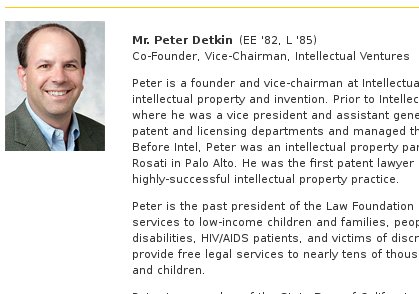

IN OUR previous coverage about the masochist (Microsoft's patent troll) we highlighted the fact that his racketeering operation is finally coming under fire from the mass media. "Podcast exposes Myhrvold's criminal enterprise," summarises it Homer, stressing that: "This is the full one-hour podcast of the investigative report conducted by Laura Sydell and Alex Blumberg into the patent terrorist known as Nathan Myhrvold, as transcribed on NPR and This American Life. Consider it essential listening for anyone wishing to understand the patent threat in the US, and in particular the seedy, underground world of patent extortionists like Nathan Myhrvold. It goes into a lot more depth than the articles."
This week's episode of This American Life is absolutely worth listening to. The TAL team has been doing more and more amazing investigative reporting work in the past year or so, and this week's episode is called, "When Patents Attack!" which was apparently a last minute change from the much more bland and misleading "Invention Peddlers." The episode was done by Planet Money's Alex Blumberg and NPR's Laura Sydell and there's a written version of the story on the Planet Money blog, which covers most, but not all, of what's on the audio version (and, yes, it's nice that the story refers to Techdirt as an "influential blog," though it looks like they may have only done that in order to have someone they could "quote" calling Intellectual Ventures a "patent troll").
Last weekend I was thrilled to hear one of my favorite radio programs, This American Life, take up the issue of software patents. Computer programmers have been sounding the alarm about this problem for two decades, and it’s great to see mainstream media outlets finally start to give the issue the kind of attention it deserves. TAL devoted a full hour to the subject, focusing on Intellectual Ventures (which I’ve written about at length) and did an absolutely spectacular job.
Google, whose Android operating system is currently on the business end of dozens of patent lawsuits, has a combative post accusing its competitors of ganging up on it with “bogus patents.”
Is ex-Microsoftie Nathan Myrhvold's company getting shell companies like Lodsys to demand payment for software patents? And is there any evidence those patents help innovation in software?
'This American Life' did some great reporting about software patents. Ask them to help solve these problems and offer the show in patent-free formats.
This American Life is a radio show that airs weekly on public stations throughout the United States. Their most recent episode, “When Patents Attack!”, covers a story that's familiar to many of us. In an hour-long show, they explain what patent trolls do, illustrate how patent litigation and threats hamper software development, and investigate the inner workings of one particularly notorious troll company, Intellectual Ventures.
AMERICA is still in denial, but among economists and wonks I think the hard truth is settling in: we're not as rich as we thought we were and our prospects for future high growth rates aren't looking so great. America's last best hope for breaking free from what Tyler Cowen has called "the great stagnation" is the discovery of new "disruptive" technologies that would transform the possibilities of economic production in the way the fossil-fuel-powered engine did. As it stands, growth, such as it is, depends largely on many thousands of small innovations increasing efficiency incrementally along many thousands of margins. Innovation and invention is the key to continuing gains in prosperity.
Zero-sum "win the future" rhetoric notwithstanding, it doesn't much matter whether the advances in new technology occur in China, India or America. Nevertheless, it remains that America is the world's leader in technical invention, and continues to attract many of the world's most inventive minds. That's why it is so important that America remain especially conducive to innovation. And that's why America's intellectual-property system is a travesty which threatens the wealth and welfare of the whole world. It may seem a recondite subject, but the stakes couldn't be higher.